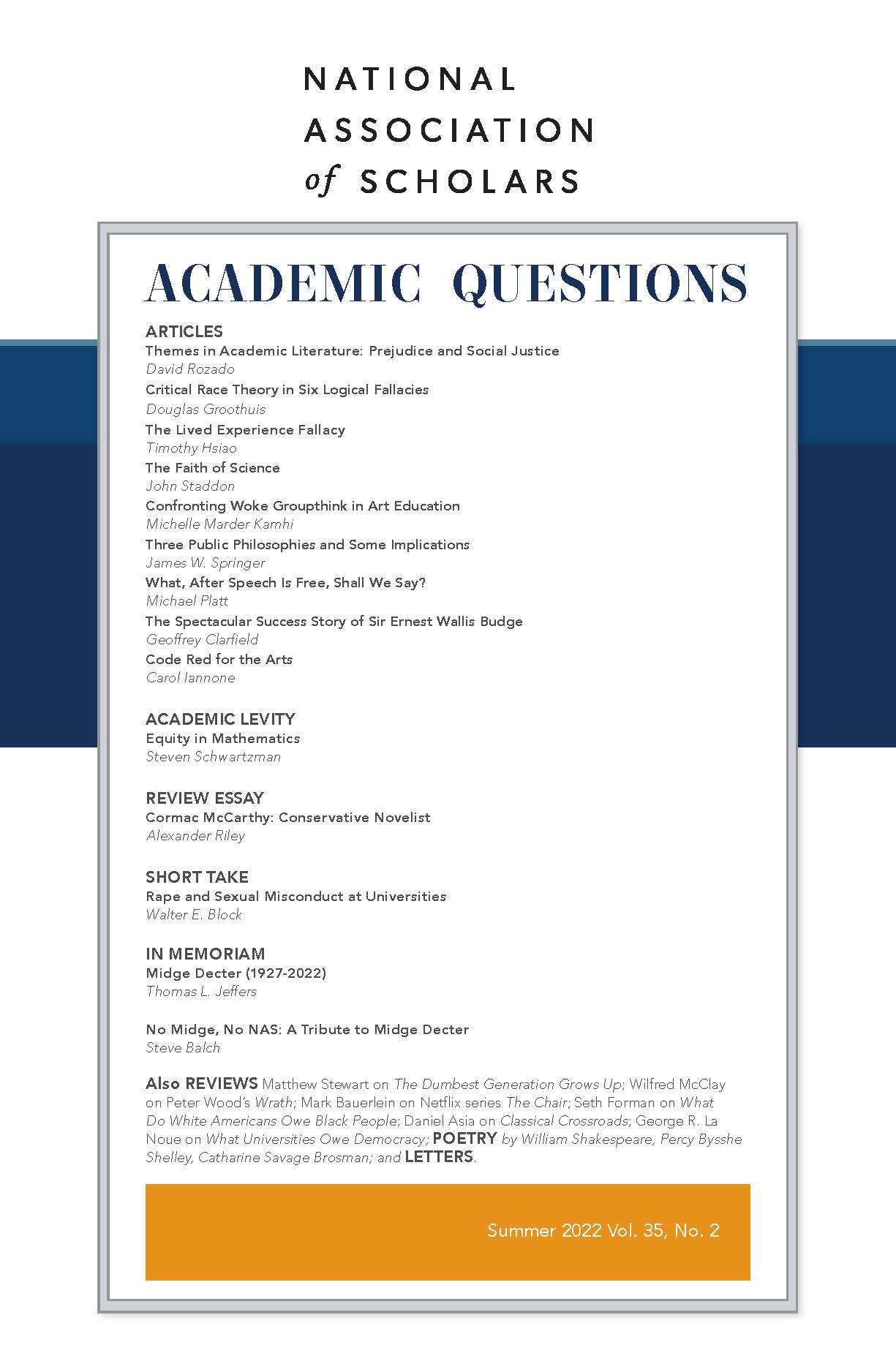Themes in the Academic Literature: Prejudice and Social Justice
Daniel Rozado, Otago Polytechnic
Despite a marked decline in prejudicial attitudes among the public at large, a survey of 175 million scholarly articles published over the last five decades has found a sharp spike in words denoting prejudice and social justice themes beginning in 2010 and lasting at least through the first few months of 2020, a pattern observed within news media content as well.
Critical Race Theory in Six Logical Fallacies
Douglas Groothuis, Denver Seminary
Logical fallacies, according to philosopher Douglas Groothius, “are the bane of critical thinking.” Ironic, then, that Critical Race Theory is full of them.
The Lived Experience Fallacy
Timothy Hsiao, University of Arkansas Grantham
Professor Timothy Hsiao has noticed a pronounced inclination among college students to accept personal experience as the basis for determining political beliefs. But personal anecdotes do not invalidate statistical generalizations. This basic rule of statistical reasoning seems to have been lost on people who should know better.
The Faith of Science
John Staddon, Duke University
It is an old but wise truism, says psychologist John Staddon, that the “facts of science cannot provide a set of values by which to live.” But when the motives and values necessary to sustain it are strongly reinforced, science can be a guide for living a moral life.
Confronting Woke Groupthink in Art Education
Michelle Marder Kamhi, Aristos, an online review of the arts
For the crimes of challenging the National Arts Education Association’s rigid adherence to Critical Race Theory, transgender ideology, and “systemic racism,” as well as for questioning the assumption that art teachers are morally obliged to be “actively antiracist,” art critic Michelle Marder Kamhi has been booted from the NAEA Collaborate Community.
Three Public Philosophies and Some Implications
James W. Springer, author of Repatriation and Erasing the Past (2020)
James Springer posits that three public philosophies have been predominant in the modern world. All three have advantages and disadvantages, but only one ensures the objective study of science and humanity.
What, After Speech Is Free, Shall We Say?
Michael Platt, author of Mighty Opposites: Machiavelli and Shakespeare Match Wits (2021)
The over-specialization of academic disciplines, the decline of core curricula, deference to student sentiment, administrative overreach, and restrictions on speech have erased the university’s role in fostering the great humanistic conversations vital to self-governance.
The Spectacular Success Story of Sir Ernest Wallis Budge
Geoffrey Clarfield
A pivotal figure in the field of Egyptology, Assyriology, and biblical studies, Sir Ernest Wallis Budge was an illegitimate child of the Victorian age who succeeded against the odds. Today he is castigated by archeologists anxious to distance their field from its imperialist birth.
Code Red for the Arts
Carol Iannone, National Association of Scholars
An absorbing and bittersweet film from the 1990s speaks to tyranny’s hatred of the arts, the timelessness of great music, the universality of beauty, and the lie of “cultural appropriation.”
ACADEMIC LEVITY
Equity in Mathematics
Steven Schwartzman
Math teacher Steven Schwartzman explains that the equity activists have set their sights on mathematics, condemning the marginalization of whole numbers labelled “odd.”
REVIEW ESSAY
Cormac McCarthy: Conservative Novelist
Alexander Riley, Bucknell University
Where some critics see only dystopia and misanthropy in the violent novels of Cormac McCarthy, sociologist Alexander Riley notices a “distinct moral core” in McCarthy’s best-known fiction, drawing from both conservative and Christian values.
SHORT TAKE
Rape and Sexual Misconduct at Universities
Walter Block, Loyola University
Sexual harassment is a serious offense with unique characteristics that make the determination of guilt especially difficult. Economist Walter Block asks why, then, on college campuses “is this crucially important task undertaken by university faculty members,” few of whom have any experience in civil and criminal investigation?
IN MEMORIAM
Midge Decter (1927-2022)
Thomas L. Jeffers, Marquette University (emeritus)
A trenchant culture warrior and a warm and lively raconteur, author Midge Decter leaves us with a cache of incisive criticism to guide us in this decisive cultural moment.
No Midge, No NAS: A Tribute to Midge Decter
Steve Balch, National Association of Scholars (founding president)
Among the many intellectual luminaries who helped birth the National Association of Scholars, Midge Decter was “The One.”












